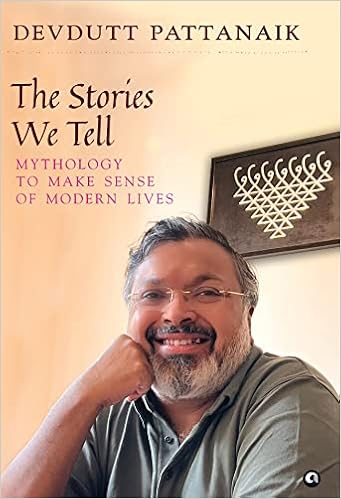10th Book of 2022
Discussing Indian mythology has become my new favorite thing. To discuss, you also need to know about it which has made me incline towards mythology books. There are only few authors who write on this in non-fiction genre trying to state facts as it is without shying. One such author is Devdutt Pattanaik who has become quite popular for retelling mythology from different perspective. He also faces certain criticisms for diluting some facts but it is inevitable to get through this because the topic is sensitive and some people genuinely get hurt if they don’t find things written the way they know about it. I am just done reading Pattanaik’s latest book released by Aleph named “The Stories We Tell” having a tagline that says “Mythology to make sense of modern lives”.
This 212-pages book discusses 72 different topics/tales which speaks about different kinds of mythology not only associated with Indian culture but other cultures and establishments too. Devdutt tries to widen our vision about how some stories are retold in different texts and cultures with the names of every culture’s respective Gods or Kings. The similarities between these stories were really surprising as the cultures are widely separated by the geography yet they speak almost the same thing. I kept on getting astonished in terms of how stories pass not only from one generation to another but even from one culture to another.
There are tales not only from Ramayan and Mahabharat but other vedas and puranas too. This really makes this book unique because the kind of stories and characters we get to know are generally not spoken about in other mythology books. It initially became really overwhelming for me to understand which character belongs to which phase of mythology but it makes you surf Internet to better your knowledge base. It actually helped me understand many different aspects of our Indian culture. There are few chapters which closes with moral or question or author’s perspective on the tale. In any case, it makes you think and realize what did the whole thing mean and that’s the magic the book does with you.
There are few pointers that stayed with me which I would like to mention as bullets below:
- Author tells how Vishnu’s avatars are shared on social media which relates with the Human evolution theory but Devdutt gives it new outlook based on the caste system which I really found interesting.
- Different versions of Kartikeya’s birth tells us of India’s diverse and complex layers in its culture.
- The chapter on “Two Epics One Theme” tells us many similarities between Ramayan and Mahabharat which is surprising. Author also discusses few differences to give the complete view of it.
- Surpanakha’s chapter was interesting for me as we only know about her from the moment she finds Ram in the jungle but here we get to know about her history before that incident which was a new learning for me.
- Author clarifies the difference between Asuras and Rakshasas in one of the chapters which I believe is very necessary for people to know because generally we categorize them as the same kind of people.
- “Hara and Hari” tells us the difference in personalities of Shiva and Vishnu yet author discusses how they are portrayed completely different in their images.
- I never knew about Goddess Lakshmi’s sister, Alakshmi and even a Diwali ritual dedicated to her made me feel quite ignorant. Haha!
- Another chapter on prominence of Numbers in our history and vedas is nicely described using which author also explains why he stopped at 72nd tale in this book.
- The relevance of few animals such as Fish or Horse is dedicated a chapter which makes us understand why we often keep seeing or hearing about them in almost every mythological tale.
- The difference in versions even in Abrahamic culture is catchy to read because people often say that Hinduism has multiple references whereas other religions doesn’t.
These are just few takeaways from the book otherwise there are many points which you would like to learn and keep in your mind so that you can have enough insights about our stories and culture. I wish I had a great memory to store a wonderful book like this in my brain forever. The chapters are short which makes it easy for you to read 4-5 of them every day and consume them slowly. As Devdutt has put it in his previous books, I would have loved to have him make us understand these stories through some hierarchical diagrams or images because few chapters had so many characters and their relationships explained that I would lose the link again and again.
Except that, this book is a good company to have while traveling or before sleeping every day. I give this one 4.5 stars out of 5. A very knowledgeable and well-researched piece of work.
Thanks.
WRITING BUDDHA


.JPG)

3 comments:
Nice Blog.. Thanks for Sharing.. scented candles for mother's day
nice post . Thank you for posting something like this..Tunisia medical tourism
Great Post!!....sexting job
Post a Comment